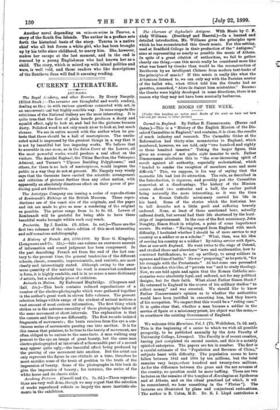SOME BOOKS OF THE WEEK.
[Under this heading we notice such Books of the week as have not been reserved for review tee other forms.)
Carmel in England. By Father B. Zimmermann. (Burns and Oates.)—This is a "History of the English Mission of the Dis- calced Carmelites in England," and contains, it is clear, the results of much industry and research. The Carmelite Order at the Reformation had thirty-nine monasteries in England, which numbered, however, we are told, only "two hundred and eighty or three hundred inmates." Taking the larger figure, this gives an average of not quite eight inmates to each. Father Zimmermann attributes this to "the ever-increasing spirit of revolt against all authority, especially ecclesiastical, which "tended to render the reception of members more and more difficult." This, we suppose, is his way of saying that the monastic life had lost its attraction. The rule, as described in the Introduction, is rigorous, and possibly pat the Carmelites somewhat at a disadvantage. The history of the Mission covers about two centuries and a half, the earlier period being naturally the more interesting, as it was the time when a Roman Catholic missionary carried his life in his hand. Some of the stories which the historian has to tell describe not a little peril and suffering bravely endured, None, at least of those mentioned here, actually suffered death, but several had their life shortened by the hard- ships of imprisonment. In the case of the first missionary, John Doughty, Simon Stock in religion, a point of some importance occurs. He writes : "Having escaped from England with much difficulty, I hesitated whether I should be of more service to my
country as a soldier or as a scholar." What, then, was his idea of serving his country as a soldier ? By taking service with Spain, then at war with England. He went twice to the siege of Ostend, and studied there and elsewhere "laws and mathematics, how to construct fortifications, to set up artillery, to array soldiers in squares and line of battle." He was "preparing," as he puts it, "for
his struggle with the Protestants." At last some one persuaded him to abandon this idea of "private war" and to study theology. Now, we are told again and again that the Roman Catholic mis- sionaries were absolutely loyal, and suffered, not for any political
designs, but for their faith. What about Father Simon Stock ? He returned to England in the course of his military studies "to
collect money," and was arrested. We should like to know Father Zimmermann's opinion as to whether the authorities would have been justified in executing him, had they known of his occupation. We suspect that this would be a "ruling case." It is quite clear that, whether a man became a soldier in the service of Spain or a missionary priest, his object was the same,— to overthrow the existing Government of England.


































 Previous page
Previous page